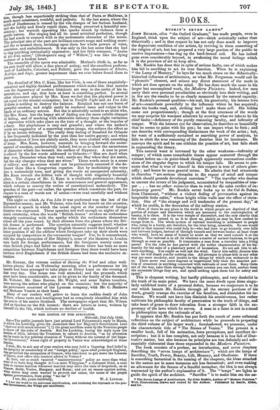The Rosalind of Mrs. C. Kean, like her Viola, is
one of those exquisitely- conceived and highly-finished performances which make him that mourns over the degeneracy of modern histrionic art stop in the midst of his la- mentations, and say, that here at least is something perfect. In several ether characters played by Mrs. Kean we feel that the physical power is not equal to the mental conception; but in Twelfth Night and As You Like It there is nothing to destroy the balance. Rosalind has not one burst of powerful emotion, and might easily be rendered tame and vulgar in the hands of an ordinary actress. But she is admirably suited to an artist who, like Mrs. Kean, has the happy art of finding out the more subtile changes of feeling, and of marking with admirable delicacy those slight variations of expression which take place on the turn of a thought or the impulse of a fancy. Her playfulness is easy and graceful; and where the author's words are suggestive of a somewhat coarse image, she softens the effect as if by an innate delicacy. The really deep feeling of Rosalind for Orlando is less frequently indicated by the poet than her native gayety; and when the confessions of love are plainly made, they seem clothed with something of irony. Mrs. Kean, however, succeeds in bringing forward the under- current of emotion, unobtrusively indeed, but so as to show the earnestness of character which lies beneath the surface of flippancy. A case in point is offered by the few words addressed to Orlando—" Men are April when they woo, December when they wed; maids are May when they are maids, but the sky changes when they are wives." These words occur in a scene of raillery, and an actress would not be particularly censured if she de- livered them like a Congrevisui repartee. But by modulating the voice into a melancholy tone, and giving the words an unexpected solemnity, Mrs. Kean reveals the hidden vein of thought with singularly beautiful effect. The Jaques of Mr. C. Kean is a creditable performance; though there is a certain cheerfulness in his countenance and general appearance, which refuses to convey the notion of constitutional melancholy. The speeches of the part—or rather, the speeches which constitute the part, for Jaques is a man of words not of action—were read carefully and without exaggeration. The night on which As You Like Is was performed was the last of the Haymarket season; and Mr. Webster, who took his benefit on the occasion, delivered a speech in which the usual regret at the number of foreign theatres was expressed. These speeches tell well enough on nights of dra- matic solemnity, when the words British drama" awaken an enthusiasm strangely contrasting with the apathy which the enthusiasts themselves evince all the year round, by their absence from the places where the Bri- tish drama is performed. The question naturally suggests itself, whether the lessee of one of the existing English theatres would find himself in a better position if all the edifices where foreigners take up their abode were occupied by competitors in the vernacular tongue? For, be it remembered, with the single exception of Her Majesty's, none of the theatres in London were built for foreign performances, but the foreigners merely came in when British plays had failed to attract. Hence there has been no more competition between Englishman and foreigner than there would have been between rival -Englishmen if the British drama had been the exclusive at- traction.


























 Previous page
Previous page